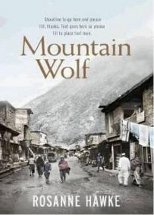Mountain wolf by Rosanne Hawke

Angus and Robertson, 2012. ISBN 978 0 732293871.
(Ages: 14+) Highly recommended. Pakistan earthquake. Child slavery.
An earthquake in the hills of Pakistan ruins the life of Razaq, the
son of a family of sheep herders living in a small community.
With all his family dead, Razaq must find his way to the city and
his Uncle Javaid for help.
After talking to some Aid workers, he finds his uncle's wife's aunt,
and being a dutiful Muslim boy, helps her with with food and
shelter. Dazed by what has happened she thinks he is her son, and
when a man offers to get him a job in the city, she complies and
sends Razaq with him. This is the first time Razaq is sold, and each
sale brings a further degradation in his life, but he remains
hopeful that he will find his uncle. His journey takes him to the
slums of Rawalpindi where he is befriended by several children
living on the trash heaps. But he is soon found and returned to the
last person who bought him, and beaten for escaping. He is sold on
to Mrs Mumtaz and here to his horror, he is trained to be a masseuse
but told to offer extras. When he is disobedient he is locked in his
room, receiving food from the eunuch, Bilal, who discloses how he
came to be cut.
Chapters from the perspective of his uncle, show the two are coming
closer together, and reveal the enormity of the problem within these
cities as he scours government departments, church groups, aid
workers and street people for information about his nephew.
This story of a boy being sold from one hand to another, finally
ending up as a male prostitute, gives an immensely human face to the
stories heard on nightly news programs. These skim the surface,
while this book gives an informed and layered tale of children in
need being used by those who should care for them. Rosanne Hawke
sends a clear message that both Islamic and Christian teachings
expect children to be protected. She shows that a few take advantage
of their vulnerability, instead of keeping them safe.
This is one extraordinary book. Every sentence breathes the essence
of life in the Muslim world: no reader can miss the references to
close knit families, or the obligation family members owe to each
other, often looking for their relative long after hope is almost
lost.
But Rosanne Hawke also paints the seamier side of life particularly
well. Sensing that a child is to be raped, I was amazed at how she
was able to show this without making it lewd, managing to inform
while at the same time making the reader cry out with fear for the
child, and keep reading, hoping that something good would happen.
She does not hold back on what happens to Razaq in the brothel, nor
what happens to the other children there, one of whom, the young
girl, Tahira, becomes dear to him.
This is an important book for secondary students to read. Not only
do they get a particularly good story, well told, but they will
learn much about a society that is often villified in our press. In
Razaq and the other children he meets along the way we see what
happens to children in war or a disaster where protection for the
vulnerable is ignored. And this could apply to any children,
anywhere.
Fran Knight